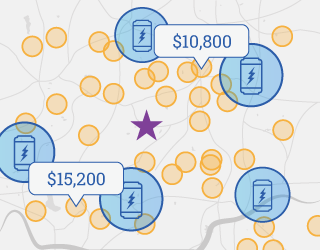LG Chem launched their first home battery in North America – the RESU10H – in mid-2017. In a crowded energy storage system market, LG provides an already-recognizable brand with household consumer products. EnergySage conducted a Q&A with LG Chem to better understand how debuting RESU10H aligns within their current lineup of appliances, and to learn what customers can look forward to in 2019. (Interview has been edited for brevity and clarity.)
LG Chem at a glance
[EnergySage] Tell us about the history of LG Chem. What’s the background of the company and how have you grown so far as a chemical company and battery manufacturer?
[LG Chem] LG Chem is a $24B profitable company whose financial strengths are rooted as a chemical company with more than 23 years’ experience developing lithium technologies. By successfully supplying global markets – i.e., consumer electronics, electric vehicles and now stationary products – LG Chem is an industry leader who is well positioned to support the growing energy storage market. Although LG Chem has just entered the ranks of the US residential storage market, there are many LG Chem batteries out there, some you may already be using. At present, more than 700k electric vehicles are on the roads today, using LG Chem cells, most notably the Chevy Bolt among other electric vehicles.
[ES] What is your primary product for homeowners?
[LGC] The first of LG Chem’s batteries to hit the US market is the LG Chem RESU10H. While different RESU models offer a range of storage capacities throughout the world, in the US, LG Chem’s focus has been the RESU10H. (ES aside: This product fills a similar role at a similar price point as Tesla’s Powerwall and ElectrIQ’s Power Pod.)
[ES] How has LG Chem’s experience in the chemical industry impacted the company as a battery manufacturer?
[LGC] LG Chem is steadfast with advancing lithium batteries for the automotive industry and the stationary storage space will continue to benefit from these innovations. For example, LG Chem doubled the energy density of their battery modules, while maintaining the same footprint. It’s a natural progression for the company to now bring these kinds of innovations to the residential space, as the LG Chem RESU10H has a higher density than many comparable home energy storage solutions.
The future of the solar + storage industry
[ES] We’ve heard of demand outstripping supply for batteries in the US. How can LG Chem and solar installers overcome that barrier?
[LGC] Solar installation companies are concerned about having a consistent supply of product and in turn, will not promote it alongside their solar sales. Currently, there is a shortage for RESUs because of high consumer demand for home storage and emergency back-up. At the same time, the shortage in the product is also indicative of high demand for solar + storage. From LG Chem’s perspective, to help overcome this barrier, it is important for installers to be notifying their distributors at the onset of a signed contract in order to lessen their lead time for RESUs. Lithium batteries, by nature, have a shelf life and you want to work with a distributor that is managing inventory appropriately, ensuring that you have a reliable supply of quality batteries.
[ES] The economics of storage are different for utilities than for homeowners. How do you see those economics evolving in the future?
[LGC] There are many value streams available to many stakeholders related to residential energy storage and the market is currently trying to quantify what they all are. Presently, the primary value streams for energy storage available to homeowners are backup applications and daily cycling for consumers on a time-of-use rate. In time, more utilities will offer programs where a homeowner can opt-in and use their RESU to help the grid avoid higher prices or even blackouts. However, how utilities will monitor and control residential batteries is still being evaluated and determined. Until utilities can “stack” the value streams of residential storage themselves, this inability to fully capture all value streams for consumers could prove to be a barrier to the mass adoption of residential storage.
Interested in a residential energy storage system?
The LG Chem RESU10H battery is currently available through the company’s US installer network. Whether you want to install an LG Chem RESU or other home battery pack, you should verify that your installer is qualified to install the product. Adding energy storage to your home requires electrical expertise, certifications, and knowledge of the best practices to properly, and safely, install a solar-plus-storage system.
A qualified EnergySage-Approved company can provide recommendations on the LG Chem home battery and other energy storage options that are available to today. If you are interested in receiving competitive quotes from local solar and storage installers simply join the EnergySage Solar Marketplace today and indicate what products you’re interested in your profile’s preferences section.






